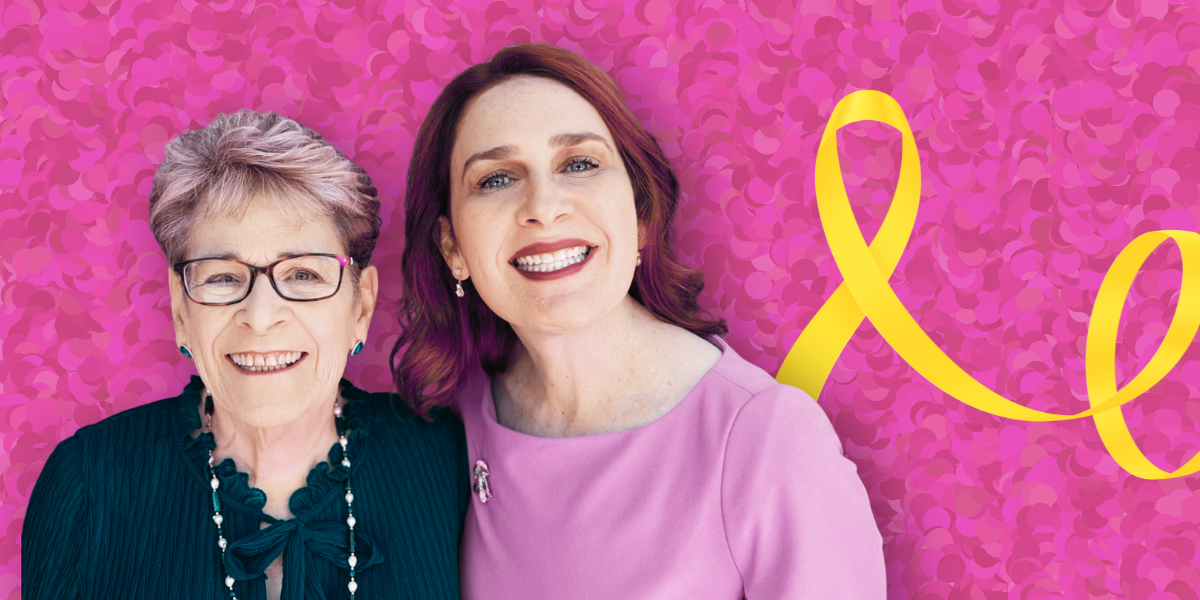Being Jewish
Commentary
My Battle Against Cancer—and Antisemitism

There is a popular ice breaker where a person is asked to use three attributes to describe themselves. My three have changed as I’ve aged.
In my 20s, I would have highlighted my studies, professional roles and political beliefs. In my 30s, my identity was consumed by my roles as wife, mother and family project manager. In my 40s, as I cared for my declining mother, the importance of being a daughter took center stage. And as I faced a melanoma diagnosis just after my 40th birthday, I defined myself as determined and defiant.
But there is a through line in my life, a constant that may not have ever made my “top three” but in truth was always my defining attribute. I am a Jew.
At the end of March, I lost my mother, Margery Braun Greenwald, to pancreatic cancer. She was a five-time cancer survivor; yes, five different types of cancer. She was 75. My father passed away 24 years ago from non-Hodgkin’s lymphoma. At age 46, I am now a two-time cancer survivor, having also battled and beat breast cancer.
I can’t think of a single relative of my parents’ generation who hasn’t battled or lost their life to cancer; my mom and dad as well as my four aunts and uncles. There is something very Jewish about cancer, not just the frequency of certain cancers among Ashkenazi Jews, but the uncertainty one must wade through in its treatment. It is not unlike the struggle of Jews throughout time and place, often uncertain of their safety and fate.
In 2024, we live in a moment of existential threat to Israel and the Jewish people. For 3,000 years, Jews have fought to ensure that our religion, culture and heritage survive. And while Jews have relied on advances in technology, such as the Iron Dome defense system, as safeguards, they have also called on their faith. As a cancer patient, you must trust in the genius of modern medicine and simultaneously accept the many things in life that are out of your control.
There is often no logic to who gets cancer. My family has tested negative for every possible gene mutation. There is also no logic to describe how a tiny people amounting to less than .02 percent of the world’s population has somehow been misunderstood to be “too powerful” and thus “dangerous” in numerous civilizations.
The Jewish people have always faced hardship. My grandfather, a first-generation American who spoke Yiddish until he went to kindergarten, was born in Boyle Heights, Calif. He was the prototypical first-generation American. He worked hard, kept his head down and rose to success. He used to tell my mother when she was procrastinating on her homework as a child to “buckle down and crank it out.” He also used to tell me, “Julie, it is written in the Torah, Jews live long, but we suffer!” That is who we are as a people, we persevere.
Beyond survival, what does it mean to thrive after a cancer diagnosis—and as Jew today? For me, it means finding purpose in something greater than myself and connecting to my religion and my people.
I am a lawyer and, before cancer, a law professor. Since October 7, I have become a full-time, unabashed advocate for Israel. I am fighting tooth and nail to combat the antisemitism threatening to swallow us all. I have used my legal expertise to file written briefs against discriminatory practices, given speeches at local government forums and drafted op-eds.
Fighting back against antisemitism is like fighting back against cancer. The more power you seize from the disease, the stronger you feel. You empower yourself not to be a victim.
When my dad was dying, people would say to him, “life sucks.” He would always respond, “no, life is beautiful, but it is unfair.” There is hardship in everyone’s life, regardless of circumstances. But our ability to choose to see the beauty in existence is what makes us Jewish.
After my first cancer diagnosis, a therapist asked me to identify three qualities in a person that I wished to emulate. I answered that I wanted to replicate my mother’s resilience, her perseverance and her gratitude, traits taught to her by her parents and grandparents. They were lessons instilled in her at Shabbat dinners, synagogue services and through the Torah itself.
My mom made it to my son’s bar mitzvah last year to enjoy the simcha and embody the meaning of l’dor v’dor to my two children. At one point during a hospital stay, she told a rabbi how “Jewish” her grandchildren were, and he said to her that she could go peacefully knowing that she had done her part.
When I go, I want to know that I have done everything I can to pass on my Judaism and my fight to my kids. Someday when they face their own mortality, either as an individual or as a collective group of Jews, may they always remember to be fierce.
We can choose to be victims, or we can stand tall and be proud Jews, preserving the heritage and wisdom we have inherited from the generations who came before us. I choose to be loud and proud.
Julie Marzouk is an attorney, author and activist








 Facebook
Facebook Instagram
Instagram Twitter
Twitter
Edie Rubin says
Excellent and very much my form of thinking about our unfortunate times at this time in Eretz Israel. Todah Rabah
Sherry Rosenberg says
Absolutely strong, beautiful and meaningful words to gain strength from and purpose for us.